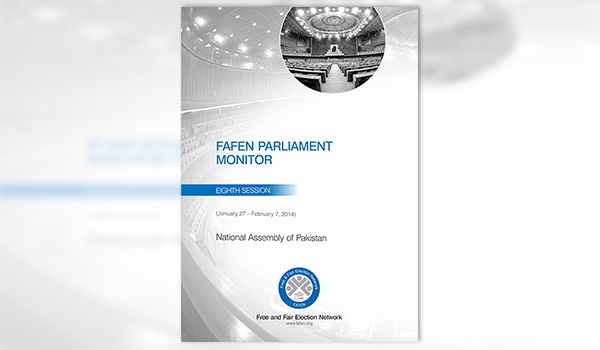 The National Assembly’s eighth session was marked by the contentious passage of two government- backed anti-terrorism bills and the extension of terms of anti-terrorism ordinances amidst protests by the opposition benches. The long-awaited arrival of the Prime Minister and low interest of lawmakers in terms of attendance and participation was also witnessed, says Free and Fair Election Network in its report based on direct observation.
The National Assembly’s eighth session was marked by the contentious passage of two government- backed anti-terrorism bills and the extension of terms of anti-terrorism ordinances amidst protests by the opposition benches. The long-awaited arrival of the Prime Minister and low interest of lawmakers in terms of attendance and participation was also witnessed, says Free and Fair Election Network in its report based on direct observation.
The House passed two treasury-backed bills while six private member bills were introduced and sent to the relevant committees. Bills passed by the House – the Anti-Terrorism (Amendment) Bill, 2014 and the Anti- Terrorism (Amendment) Bill, 2013 – were based on two of three anti-terrorism ordinances issued by the government in October last year which were laid before the National Assembly on November 7, 2013 to be passed as bills before the expiry of their constitutional term of 120 days. The passage took place despite the opposition’s criticism of inherent violation of human rights in the bills. The earlier bill was debated by 36 MNAs before its passage whereby the opposition benches demanded that the legislation be sent back to the standing committee till reservations of all parties were satisfied.
However, the PML-N backed bills were passed despite opposition parties, including the JI, MQM and PPPP, tabling five resolutions expressing disapproval of the legislation, none of which were taken up. The entire opposition aired their grievance over the passage of the bills by staging a token walkout as well.
Both legislations address shortfalls in the Anti-Terrorism Act, 1997. The Anti-terrorism (Amendment) Bill, 2014 strengthens the provisions in the parent Act related to terrorism financing and also puts a fine up to ten million rupees on any person (legal or otherwise) who violates the provisions of the proposed law.
In light of the lack of consensus between government and opposition parties regarding counter-terrorism legislation, the House adopted three resolutions seeking the extension of the term of the Anti-Terrorism
(Amendment) Ordinance, 2013 (VII of 2013), the Anti-Terrorism (Amendment) Ordinance, 2013 (VIII of 2013) and the much criticized Protection of Pakistan Ordinance, 2013 (IX of 2013) for a further period of one hundred and twenty days.
To show solidarity with the people of the occupied Kashmir on Kashmir Day observed yearly on February 5, the House adopted a JUI-F sponsored resolution reiterating Pakistan’s stance on Kashmir dispute based on principles acknowledged by the International community as well as United Nations in its resolutions. The resolution strongly condemned human rights violations in occupied Kashmir and demanded the Indian government to respect Kashmiris’ right to self-determination. On another resolution tabled by a PPPP female the House stressed upon the government to take immediate steps in resolving the issue of construction of dams by India on the waters of Pakistan. The resolution was debated by the House whereof lawmakers asked for a re-examination of the 1960 Indus Waters Treaty between India and Pakistan and demanded the construction of uncontentious and small dams.
Additionally eight standing committee reports were laid before the House – seven on scrutiny of legislations, including anti-terrorism bills, and an annual report of the State Bank of Pakistan on the State of Pakistan’s Economy for the year 2012-2013.
In response to the gas and electricity load shedding in the country, a female MNA of PPPP moved a motion for debate on the matter. Five MNAs took part in the initial discussion before the motion was re-laid on the request of PML-N lawmakers as a Motion under Rule 259 to be discussed later; however it remained unaddressed till the end of the session.
All but one calling attention notice (CAN) on the agenda, submitted to primarily bring governance related matters in the notice of the government, were taken up. Some issues highlighted through CANs include unguarded railway crossings, delayed process of applications for National Identity Card Overseas Pakistanis (NICOP) in Pakistan’s consulates in United Kingdom, delay in polio vaccination programs in Federally Administered Tribal Areas (FATA), illegal occupation of valuable land of Karachi Port Trust and increase in the prices of drugs by the pharmaceutical companies.
For complete report click here








